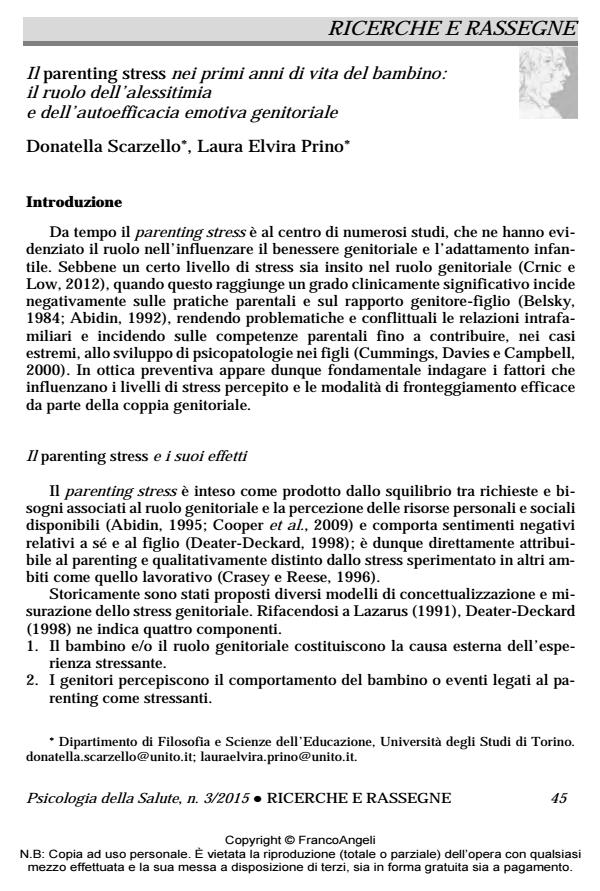Parenting stress in the early years of child life: the role of parental alexithymia and emotional self-efficacy
Journal title PSICOLOGIA DELLA SALUTE
Author/s Donatella Scarzello, Laura Elvira Prino
Publishing Year 2015 Issue 2015/3
Language Italian Pages 20 P. 45-64 File size 139 KB
DOI 10.3280/PDS2015-003003
DOI is like a bar code for intellectual property: to have more infomation
click here
Below, you can see the article first page
If you want to buy this article in PDF format, you can do it, following the instructions to buy download credits

FrancoAngeli is member of Publishers International Linking Association, Inc (PILA), a not-for-profit association which run the CrossRef service enabling links to and from online scholarly content.
Previous studies on parenting stress highlighted its negative effects on parental well-being, parental practices and infant adjustment. The present work is part of the research line that examines factors associated with parenting stress; it is focalized on the parental characteristics and analyzes specifically two yet little studied aspects, alexithymia and self efficacy, to underline also possible differences between mothers and fathers. Participants were 126 couple of parents of infants (9-36 mounths). The subjects filled out the following self-report instruments: Parenting stress index - short form; Tas 20 - Toronto Alexithymia Scale; scales of self efficacy in regulating negative emotions and expressing positive emotions. Results suggest that parenting stress is positively correlated with alexithymia dimensions and is negatively correlated with emotional self efficacy, but with some differences between fathers and mothers: regression analysis highlights that for the former alexithymia is a risk factor and self efficacy in regulating negative emotions is a protective factor, while for the latter only self efficacy seems play a significant role and alexithymia doesn’t modulate the parenting stress levels in a considerable way.
Keywords: Parenting stress; self efficacy; alexithymia
- Parental Relationship with Twins from Pregnancy to 3 Months: The Relation Among Parenting Stress, Infant Temperament, and Well-Being Laura E. Prino, Luca Rollè, Cristina Sechi, Luciana Patteri, Anna Ambrosoli, Angela M. Caldarera, Eva Gerino, Piera Brustia, in Frontiers in Psychology /2016
DOI: 10.3389/fpsyg.2016.01628 - Maltrattamento emotivo e sintomi somatici in età giovanile adulta. Il ruolo di mediazione dello stile di attaccamento romantico in una popolazione femminile Maria Elena Brianda, Chiara Sacchi, Pietro De Carli, Alessandra Simonelli, in PSICOLOGIA DELLA SALUTE 1/2018 pp.81
DOI: 10.3280/PDS2018-001005
Donatella Scarzello, Laura Elvira Prino, Il parenting stress nei primi anni di vita del bambino: il ruolo dell’alessitimia e dell’autoefficacia emotiva genitoriale in "PSICOLOGIA DELLA SALUTE" 3/2015, pp 45-64, DOI: 10.3280/PDS2015-003003